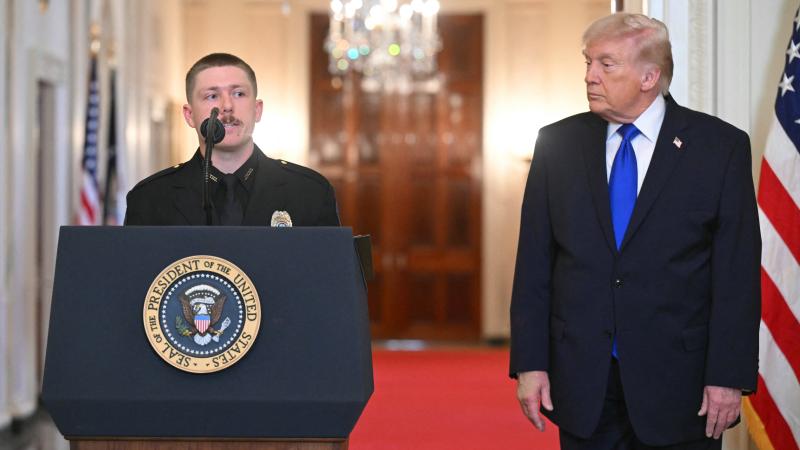Congress seeks to unmask funding for Students for Justice in Palestine and its anti-Israel protests
The group—or more accurately the network of groups—is responsible for helping to organize and galvanize the anti-Israel protest movement sweeping the country.
The National Students for Justice in Palestine is a driving force in the anti-Israel protests sweeping across the country at college campuses. The national group says it supports 350 “Palestine solidarity organizations” throughout North America, primarily SJP chapters across America.
The funding of the student chapters largely come from U.S. universities, however, National SJP is funded through intermediaries and it is not required to disclose its own finances. This dark money arrangement has obscured funding sources and donations to the group and has spurred congressional interest.
"I'm a member of the Ways and Means Committee, and earlier this year, we actually looked into the funding streams for Students for Justice in Palestine and some of these other groups that are now...look like they're inciting violence, bringing out anti-semitic behavior, calling for, you know, support of Hamas, which is, you know, a terrorist organization, designated a terrorist organization by the United States," Rep. Claudia Tenney, R-N.Y., told Just the News, No Noise TV show on Monday.
"So, you know, these are these are organizations that get dark money and they use our IRS structure, whether it's a 501(c)(3) or (4) or other other parts of the IRS Code to get around taxes and then use this for political purposes. And we need to crack down on that," she added.
The Students for Justice in Palestine network formed over time at separate universities but now includes hundreds of chapters across the United States. The organization claims roots in the General Union of Palestinian Students, which played a similar role to the modern SJP. This student group ultimately “collapsed” in the 1990s, according to SJP. But, the “Palestinian liberation” movement was reborn in the 2000s through SJP chapters.
Several SJP chapters have been criticized recently for downplaying the Hamas-led terrorist attack on Israel last October, calling it a “historic win for the Palestinian resistance.” More than 1,200 people were murdered in those attacks.
“[Across] land, air, and sea, our people have broken down the artificial barriers of the Zionist entity, taking with it the facade of an impenetrable settler colony and reminding each of us that total return and liberation to Palestine is near,” its statement read.
“As the Palestinian student movement, we have an unshakable responsibility to join the call for mass mobilization,” it promised.
The group has long been criticized for creating an environment hostile to Jews. A 2016 study from Brandeis University found “One of the strongest predictors of perceiving a hostile climate toward Israel and Jews is the presence of an active Students for Justice in Palestine (SJP) group on campus.”
There are several documented instances of intimidation. One report, from the Jerusalem Center for Public Affairs included citations of a chant at a Florida university in 2014 where SJP-led protestors chanted "Khaybar, Khaybar, oh Jew, Muhammad’s army will return,” which refers to the battle of Khaybar, where Islamic armies conquered the Jewish city in Arabia and expelled or slaughtered the inhabitants.
The National SJP did not respond to a request for comment from Just the News.
The first chapter was founded in 2001 at University of California Berkeley by Hatem Bazian, a lecturer in the Department of Ethnic Studies. Bazian specializes in “Colonialism and Post-Colonial Studies, Comparative Liberation Theologies, Critical Race Theory,” and Palestine and Arab studies, according to his faculty page.
Bazian came under scrutiny in Tablet Magazine in 2017 after reposting a series of photos to social media that the author alleged were antisemitic, including one comparing religious Ashkenazi Jews to Nazis with the hashtag “#Ashke-Nazi.” He was condemned by a Berkeley University spokesman, but did not appear to face any consequences.
Shortly after founding the first SJP Chapter in 2001, Bazian reportedly told an assembled crowd at an anti-Israel rally "take a look at the type of names on the building around campus—Haas, Zellerbach—and decide who controls this university,” insinuating Jewish donors to the school were somehow connected to an Israeli agenda.
In 2006, the disparate SJP groups were brought together under “a single umbrella” through Palestine Solidarity Movement, according to a report from the Anti-Defamation League. The PSM was founded by American Muslims for Palestine (AMP), another organization started by Bazian. He serves as the chairman of ASM’s board.
Bazian did not respond to a request for comment from Just the News.
Today, Bazian’s Americans Muslims for Palestine (AMP) serves as a hub helping to coordinate and support various pro-Palestine and anti-Israel organizations across the United States, including SJP chapters and Jewish Voice for Peace, both of which have been involved in the university protest movement.
Individual SJP chapters across the country are affiliated with the National Students for Justice in Palestine, a self-described grassroots organization which says it aims “to develop a student movement that is connected, disciplined, and equipped with the tools necessary achieve Palestinian liberation.” The national organization is not a 501(c)(3) and according to The Forward, has no national headquarters or professional staff.
“It’s not at all transparent, it’s very hidden, it’s very hard to discern what framework there might be,” Gerald Steinberg, President of NGO Monitor, told The Forward.
Students for Justice in Palestine receives funding through an opaque arrangement with progressive donor group WESPAC—which stands for the Westchester Peace Action Committee. Any donations sent to the National Students for Justice in Palestine organization notify the donor that payments are processed through the “Wespac Foundation Inc.”
Because of this dark-money arrangement, donations to the national organization are shielded from public disclosure required of nonprofits. According to the Anti-Defamation League—an organization dedicated to fighting the defamation of the Jewish people—“as a fiscal sponsor WESPAC receives and administers donations on behalf of groups” and “keeps a percentage of the donation and gives the rest to the groups/projects that it fiscally sponsors.”
In addition to any funds filtered down from WESPAC, most local SJP chapters receive a majority of their funding from universities through student activity fees, according to several SJP leaders interviewed by Forward.
Just the News reported last week that the Students for Justice in Palestine group at Columbia likely received funding from the school as a registered student organization. Because of their status as official student groups, SJP and other registered organizations are eligible for direct funding from universities through allocations of the student activity fee. At Columbia, every student pays this fee as part of their tuition and it goes towards programming costs for officially recognized groups. These fees can cost as much as $623 per student per semester.
According to a report from NGO Monitor, SJP’s close relationship with AMP through Bazian warrants concern because of allegations AMP is part of a network of Islamist tied organizations.
AMP came under scrutiny by the Virginia attorney general for allegations of impermissible use of funds and alleged terrorist ties, though the group denies these claims.
“The Attorney General’s Office has reason to believe that the organization may be soliciting contributions in the Commonwealth without first having registered with the Commissioner of the Virginia Department of Agriculture and Consumer Services,” Attorney General Jason Miyares announced in a statement.
“In addition, the Attorney General will investigate allegations that the organization may have used funds raised for impermissible purposes under state law, including benefitting or providing support to terrorist organizations,” he added.
The attorney general cited court documents filed in 2022 by representatives of the estate of David Boim, a 17-year-old American victim of an Hamas terrorist attack in 1996. The suit alleged American Muslims for Palestine is an “alter ego” of a former group which was found to have provided material support to Hamas.
According to the court documents, the organization originally found to have aided Hamas, the Islamic Association of Palestine, reconstituted as AMP. The association had some of its assets seized by the United States in a criminal investigation, however the group said it was shutting its doors, party because of the cost of the judgment in the Boim estate.
However, in 2017, lawyers for the Boim estate argued the group reconstituted as the AMP. The argument centered on the fact that the “core leadership” between the two organizations remained the same. The close association between the two groups was also noted by the Anti-Defamation League.
AMP has denied the allegations brought forward by the attorney general in the past.
“This latest attempt to smear and silence American Muslims who speak up for Palestinian human rights is not only defamatory, but dangerous,” the group said in a statement.
“American Muslims for Palestine is a duly registered non-profit organization that has stood up for justice here and abroad for over a decade in compliance with the law. If Attorney General Miyares has identified an issue with our license to fundraise in Virginia, that is a common and easily resolvable civil issue that many non-profits face and fix. By publicly making this dishonest public announcement, Mr. Miyares is clearly attempting to score political points with hateful extremists,” the group added.
The Virginia Attorney General’s office told Just the News the investigation is still ongoing.
AMP did not respond to a request for comment from Just the News about the allegations or its relationship with Students for Justice in Palestine.
The group, however, advertises its close relationship and support to SJP explicitly. “We also work in broad-based coalitions and support campus activism through Students for Justice in Palestine and Muslim Student Associations,” AMP says on its website.
Much like the SJP chapters, AMP is not a 501(c)(3), making it exempt from mandatory financial disclosures. Another groups, the Americans for Justice in Palestine Education Foundation (AJP) is the “fiscal sponsor” according to a fundraising page.
With Congress already investigating antisemitism at U.S. universities, the widespread anti-Israel protests and rhetoric coming from groups like SJP are likely to spur even further probes.
The Facts Inside Our Reporter's Notebook
Documents
Links
- 350 âPalestine solidarity organizationsâ
- spurred congressional interest
- claims roots
- its statement read
- 2016 study from Brandeis University
- One report
- faculty page
- reposting a series of photos
- reportedly told
- Anti-Defamation League
- American Muslims for Palestine
- started
- serves
- Jewish Voice for Peace
- which says
- no national headquarters or professional staff
- told
- notify the donor
- the Anti-Defamation League
- interviewed
- received funding
- cost
- a report from NGO Monitor
- announced
- said in a statement
- says on its website
- fundraising page
- already investigating
















